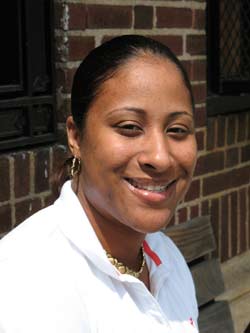
Photo by Janet Sassi
In the Soundview housing projects in the South Bronx, where Dreana Faulkner grew up, poverty, crime and drug addiction were so prevalent that nobody blinked.
“My father was in prison and my mother was a crack addict,” she said. It was her eldest brother, Yakema, who ran the household of 10 children—some of whom, Faulkner said, may not have been blood siblings.
“We basically brought ourselves up,” said Faulkner, who is graduating with a master’s degree in social work from the Graduate School of Social Service (GSS) on Fordham’s Tarrytown campus. “My mother was in and out. She’d come home for three weeks straight, maybe with another kid, and we’d think things were okay. And then she’d just disappear.”
When Faulkner was 10, the Administration for Children’s Services (ACS) intervened to remove the children, splitting the siblings up. Faulkner, accompanied by one sister and one brother, was put into a foster home—an experience she said made her feel powerless.
“The foster mother had six of us and she basically used us to clean her house. She didn’t take the time to get to know us, and she could barely remember our names,” Faulkner recalled. “I didn’t want to be there.”
Unhappy, Faulkner stopped eating. She landed in another foster home. She stopped eating again. Another home. After a string of distressing foster placements, Faulkner was put into the Edwin Gould Academy-Ramapo at age 13, a place she described as “a new-age orphanage.” Within a year, she and another girl ran away and returned to the projects with her brother.
It was there, back in the Bronx projects, that she had a revelation.
“I’d look to people who had money, and weren’t going to jail, or weren’t getting killed, and I noticed that they all were going to school,” she said. So she got her brother to register her for school. Even though she said she had an attitude, a high school counselor took a personal interest in her, and helped her get on the college track.
“She told me that I have a lot of insight,” Faulkner recalled. “She said, ‘You can give back a lot because you’ve seen a lot.’ She wouldn’t give up on me when I said I didn’t want to go [to college].”
Faulkner did go, and graduated in 2005 with a bachelor’s degree from Lehman College. She got a supervisory job at the Graham-Windam services to families and children in Hastings-on-Hudson, N.Y., and started attending Fordham part-time.
“Fordham has taught me lots of clinical skills I can use,” she said. “It also made me realize that I am still rough around the edges.”
Through Fordham, Faulkner interns at Urban Horizons Family Health Center in the Bronx, supervising therapy sessions for children and adults who have faced circumstances similar to hers.
As she understands firsthand the turmoil of troubled teens, Faulkner said she tries to help foster parents understand as well. In workshops she asks parents to write down things that they did as teens. It is a technique, she said, that helps them relate to their young wards.
“Teens have a need for some power; they are already their own people when they come to a new home. If your foster teen takes five dollars off your table, why is it any different than when you did it to your mother? To tell them, ‘If you act like this you will be thrown out of my house,’ doesn’t solve the problem,” Faulkner said. “Believe me, if you give them time, they will get better, and when all of that roughness has worn off, there will be a kid who will come back to you and say thank you.”
Faulkner wants to make a difference in the lives of lost and unwanted teens, and she said she is very emotional about her work. A mother herself, she said she knows the value of raising her 5-year-old son without trauma and with plenty of education.
“I never thought I was going to do this,” she said. “I thought I’d get a hairdressing job. But to be here is almost surreal. I tell everyone my life has been a book in the making.”
